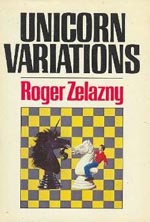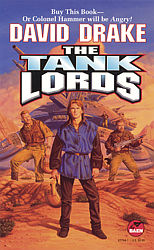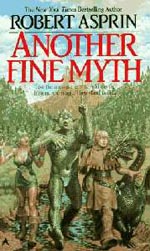 I first encountered Robert Asprin’s Myth novels in a library book sale in Rochester, MN when I spotted a copy of Myth Conceptions in the stacks. I was a young kid at the time and for some reason I thought that Robert Asprin was an author my mother had read and enjoyed, so I picked the book up as a present for her. In reality, she had never heard of him before, so I sat down to read it instead.
I first encountered Robert Asprin’s Myth novels in a library book sale in Rochester, MN when I spotted a copy of Myth Conceptions in the stacks. I was a young kid at the time and for some reason I thought that Robert Asprin was an author my mother had read and enjoyed, so I picked the book up as a present for her. In reality, she had never heard of him before, so I sat down to read it instead.
The story of Skeeve, a young apprentice who ends up, through a confidence job gone horribly awry, leading a misfit gang of interdimensional adventurers against a massive army of ridiculous size was practically ready-made for a twelve-year old steeped in Tolkien and D&D. The characters were witty and endearing. The plot was clever. The humor warm and entertaining. I immediately started hunting down the other books in the series, and its strong continuity and character growth quickly made for a solid addiction. In the years since I’ve re-read most of the Myth books two or three times.
A week or so ago, while suffering from a rather nasty head cold, I noticed the Myth books lying out on my recently rearranged and expanded bookshelves. Since I was looking for some quick comfort reading, I grabbed Myth Conceptions once again and curled up in my blankets. This, of course, freshly renewed my addiction and I spent the better part of the week plowing through most of the rest of the series.
A few random thoughts on the series and its parts:
Another Fine Myth is the first book in the series, but I’ve never been particularly enamored with it. This may be because I only managed to find a copy after I had already finished the next six books in the series, but I genuinely feel that this is one of the weaker books Asprin has to offer. The humor relies more on the mediocre puns rather than the clever character interactions of the later books. The plot also comes across as formulaic and forced. Basically, there’s a reason why I started re-reading the series with Myth Conceptions (the second volume) instead of Another Fine Myth.
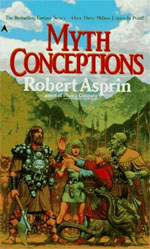 In my opinion, the series really hits its stride with Myth Conceptions: The characters come to life. The plots start to hum. The humor finds its pace. In short, Asprin finds his groove and the result is pure entertainment. From Myth Conceptions through Myth Directions, Hit or Myth, Myth-ing Persons, and Little Myth Marker the series shows consistent growth and improvement.
In my opinion, the series really hits its stride with Myth Conceptions: The characters come to life. The plots start to hum. The humor finds its pace. In short, Asprin finds his groove and the result is pure entertainment. From Myth Conceptions through Myth Directions, Hit or Myth, Myth-ing Persons, and Little Myth Marker the series shows consistent growth and improvement.
Unfortunately, that’s when the series does a pratfall.
The next volume, Myth I.N.C. Link, marks a departure in the format of the series: Rather than being told from the POV of Skeeve, Asprin’s intention was for the Myth Inc. volumes to be told from the POVs of the other characters in the series. Myth I.N.C. Link inaugurates the tradition through a series of interlocking short stories, each told from a different POV. In theory, this could’ve been really clever. In practice, it was disastrous.
The first and most immediate problem is that Asprin isn’t as comfortable inside the heads of his supporting cast as he is inside the head of Skeeve. Characters who seem full of life when viewed from Skeeve’s POV suddenly become lifeless and cliched when seen through their own.
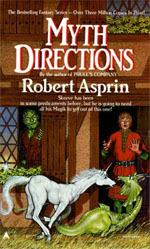 The second big problem is that Asprin, apparently spurred on by the desire for new POVs, decides to create a treepony. (For those unfamiliar with the term, it’s a pejorative reference to the treecats of Weber’s Honor Harrington novels by way of Mercedes Lackey. Basically, I’m extending the term to include any SFnal pet which suddenly begins to accrue massive intellect and amazing powers as a series progresses.) The result is as stupid as you would expect.
The second big problem is that Asprin, apparently spurred on by the desire for new POVs, decides to create a treepony. (For those unfamiliar with the term, it’s a pejorative reference to the treecats of Weber’s Honor Harrington novels by way of Mercedes Lackey. Basically, I’m extending the term to include any SFnal pet which suddenly begins to accrue massive intellect and amazing powers as a series progresses.) The result is as stupid as you would expect.
The series recovers, at least to a large extent, with Myth-Nomers and Im-pervections. The treepony is shuffled off-stage, we’re back in the believable environs of Skeeve’s head, and almost all of the problems which plagued Myth I.N.C. Link have been alleviated.
Unfortunately, the recovery is not quite complete. Myth I.N.C. Link has apparently weakened Asprin’s creative immune system and he is now being devoured by the brain eater. It’s not obvious at first, but the first nagging suggestions can be found lurking here that Asprin is suffering from one of the Three Symptoms of the Brain Eater.
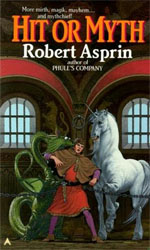 (What are the Three Symptoms of the Brain Eater?
(What are the Three Symptoms of the Brain Eater?
1. Injecting long philosophical rants into the middle of a novel.
2. Bizarre attempts to link a variety of disparate works into a single chronology.
3. A belief that a synopsis constitutes a final draft, usually coupled with rapid scene shifts between characters describing all the interesting things they just finished doing off-camera.)
Specifically, Asprin begins to rant. Not badly at first, but by Sweet Myth-tery of Life the jig is up: At least half of that novel involves Skeeve going from one character to another and listening to each of them lecture him on love and marriage. The other half involves accounting. (I kid you not.) Surprisingly, the result is still mildly entertaining. But it doesn’t hold a candle to the really good stuff that Asprin was producing just a few books earlier.
(You’ll notice I skipped Myth I.N.C. in Action. I suggest you do the same. I read it once, and that was once too many. Fortunately, unlike Myth I.N.C. Link, you can skip it without being completely lost by later continuity.)
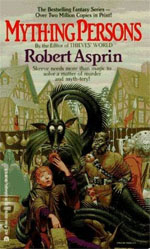 After Sweet Myth-tery of Life, Asprin thankfully took a break from the Myth series. I say thankfully, because during that time he was fully consumed by the brain eater and produced a painful barrage of utter tripe. I tried some of that tripe. It hurt. It hurt real bad. So when Asprin returned to the Myth series a couple years back with Myth-ion Improbable I was skeptical, but I was willing to give it a shot.
After Sweet Myth-tery of Life, Asprin thankfully took a break from the Myth series. I say thankfully, because during that time he was fully consumed by the brain eater and produced a painful barrage of utter tripe. I tried some of that tripe. It hurt. It hurt real bad. So when Asprin returned to the Myth series a couple years back with Myth-ion Improbable I was skeptical, but I was willing to give it a shot.
Myth-ion Improbable is something of a prequel. It’s a previously untold adventure squeezed in between the third and fourth volumes of the series. Asprin specifically wrote it as a light-hearted attempt to get back in touch with his characters before tackling the much more difficult stories waiting to be told after Sweet Myth-tery of Life. The result was fairly mediocre compared to the rest of the series, but it’s also the first readable piece of fiction Asprin managed to produce in nearly a decade.
The biggest problem with Myth-ion Improbable is Asprin’s mind-numbing devotion to detail. Imagine an entire novel in which nobody ever simply waits in town a couple of hours for their friends to show up. Instead, they stop by the saloon for a couple of drinks; walk up and down main street a couple of times; say hello to a few random strangers they happen to pass; go back to the saloon to see if their friends have shown up; head to the edge of town and sit around for awhile; get back up and head back into town… And so forth. It doesn’t help that one of the plot points is that everyone and everything in the novel’s primary dimension looks pretty much the same no matter where you go. The result is the plodding pace of a novella padded out to novel length.
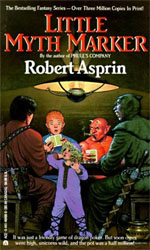 Perhaps the best thing about Myth-ion Improbable, despite its flaws, is that it really does have the feel of Asprin at his best. It promises a recovery.
Perhaps the best thing about Myth-ion Improbable, despite its flaws, is that it really does have the feel of Asprin at his best. It promises a recovery.
Asprin has now written several more Myth novels in collaboration with Jody Lynn Nye. Asprin’s previous collaborations have, in my experience, been truly dreadful. Plus, the first of these collaborations was another Myth, Inc. novel, so I haven’t gone out of my way to track these latest volumes down. But if I were to spot them on the shelf of my local bookstore, I’d probably give them a shot.
A few additional thoughts and caveats:
I hear a lot of people compare the Myth series to Xanth. Usually this is along the lines of, “It’s just a bunch of stupid puns. Like Xanth at its worst.” I think a lot of this comes from Another Fine Myth, which (as I noted above) is a lot more punny than the rest of the series. And, frankly, I’ll agree that Asprin is thoroughly mediocre when it comes to punning. But I don’t think the puns ever come close to defining the series (as they do with Xanth).
I also hear a lot of people compare Myth to Discworld, usually unfavorably. And that’s generally true: In works like Small Gods and Reaper Man, Pratchett delivers on a level and with a depth that is far beyond the best that Asprin has to offer.
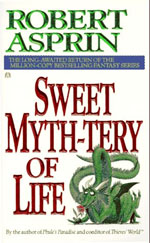 To sum up: This series gets a rough start in Another Fine Myth, but is a lot of fun from Myth Conceptions all the way through Little Myth Marker. Beyond that, it gets pretty sketchy, but I think all of the Myth volumes (as opposed to the Myth Inc. volumes) are worth your time.
To sum up: This series gets a rough start in Another Fine Myth, but is a lot of fun from Myth Conceptions all the way through Little Myth Marker. Beyond that, it gets pretty sketchy, but I think all of the Myth volumes (as opposed to the Myth Inc. volumes) are worth your time.
GRADES:
ANOTHER FINE MYTH: B
MYTH CONCEPTIONS: A-
MYTH DIRECTIONS: A-
HIT OR MYTH: A
MYTH-ING PERSONS: A-
LITTLE MYTH MARKER: A
MYTH I.N.C. LINK: C
MYTH-NOMERS AND IM-PERVECTIONS: B
MYTH I.N.C. IN ACTION: D+
SWEET MYTH-TERY OF LIFE: B-
MYTH-ION IMPROBABLE: C+
Robert Asprin
Published: 1978-2001
Publisher: Ace Books
Cover Price: $7.99
Buy Now!
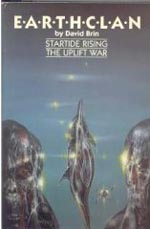 When I was about half-way through The Uplift War, I sat down and wrote the following:
When I was about half-way through The Uplift War, I sat down and wrote the following:
